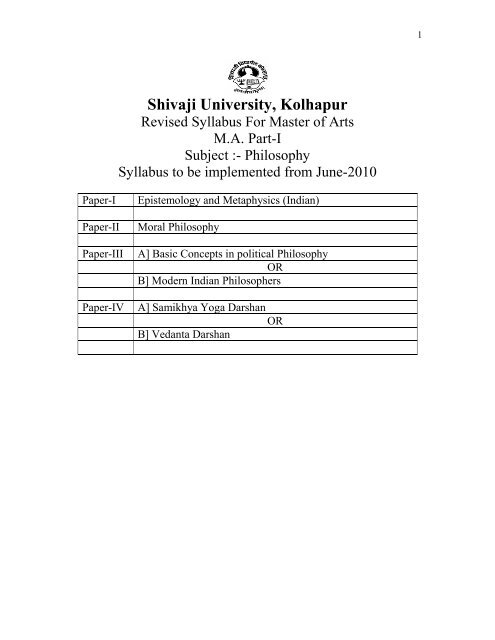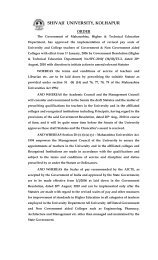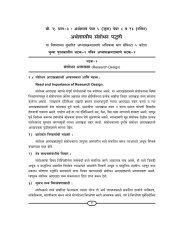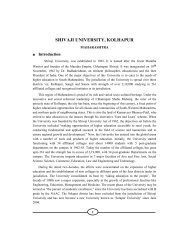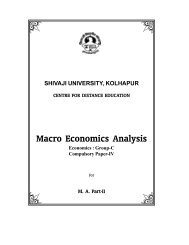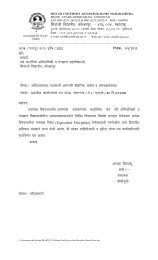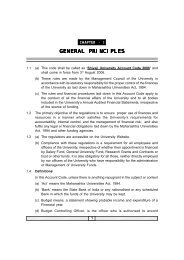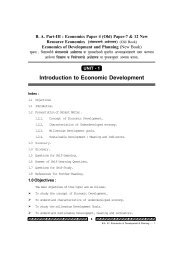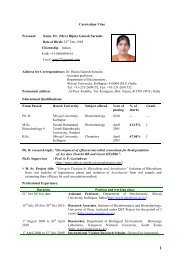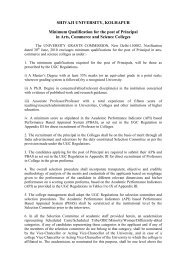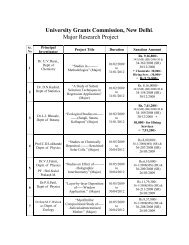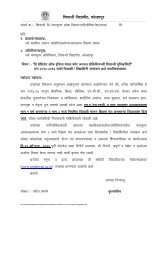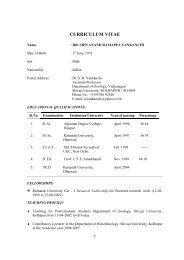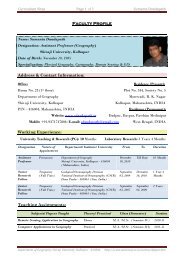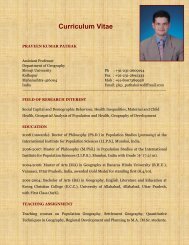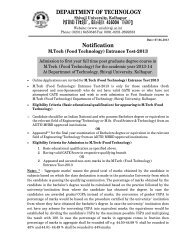I (Philosophy) - Shivaji University
I (Philosophy) - Shivaji University
I (Philosophy) - Shivaji University
Create successful ePaper yourself
Turn your PDF publications into a flip-book with our unique Google optimized e-Paper software.
1<br />
<strong>Shivaji</strong> <strong>University</strong>, Kolhapur<br />
Revised Syllabus For Master of Arts<br />
M.A. Part-I<br />
Subject :- <strong>Philosophy</strong><br />
Syllabus to be implemented from June-2010<br />
Paper-I<br />
Paper-II<br />
Paper-III<br />
Paper-IV<br />
Epistemology and Metaphysics (Indian)<br />
Moral <strong>Philosophy</strong><br />
A] Basic Concepts in political <strong>Philosophy</strong><br />
OR<br />
B] Modern Indian Philosophers<br />
A] Samikhya Yoga Darshan<br />
OR<br />
B] Vedanta Darshan
2<br />
ejkBh :ikarj<br />
,e-,- Hkkx&1 ¼rRoKku½<br />
isij dza-&1 Kku”kkL= vkf.k lRrk”kkL= ¼Hkkjrh;½<br />
isij dza-&2 uSfrd rRoKku<br />
isij dza-&3 jktdh; rRoKkukrhy eqyHkwr ladYiuk<br />
fdaok<br />
vk/kqfud Hkkjrh; rRoKku<br />
isij dza-&4 lka[;&;ksx n”kZu<br />
osnkar n”kZu<br />
fdaok
3<br />
<strong>Shivaji</strong> <strong>University</strong>, Kolhapur<br />
Revised Syllabus For Master of Arts<br />
M.A. Part-II<br />
Subject :- <strong>Philosophy</strong><br />
Syllabus to be implemented from June-2011<br />
Paper-V<br />
Paper-VI<br />
Epistemology and Metaphysics (Western)<br />
Recent Western <strong>Philosophy</strong><br />
Paper-VII<br />
Applied Ethics<br />
OR<br />
Logic and Research Methodology<br />
Paper-VIII<br />
Jainism and Buddism<br />
Symbolic Logic<br />
OR
4<br />
ejkBh :ikarj<br />
,e-,- Hkkx&2 rRoKku½<br />
isij dza-&5 Kku”kkL= vkf.k lRrk”kkL= ¼ik”pkR;½<br />
isij dza-&6 vokZphu ik”pkR; rRoKku<br />
isij dza-&7 mi;ksftr uhfr”kkL=<br />
fdaok<br />
rdZ”kkL= vkf.k la”kks/ku i/nrh<br />
isij dza-&8 tSu o ckS/n n”kZu<br />
lkadsfrd rdZ”kkL=<br />
fdaok
5<br />
M.A. Part-I (<strong>Philosophy</strong>)<br />
Epistemology and Metaphysics (Indian)<br />
Paper-I (Compulsory)<br />
Section- I<br />
1) The Nature of Cognition :<br />
a) Definition and Nature of Prama<br />
b) Definition and Nature of Pramana.<br />
c) Kinds of Pramana.<br />
2) Concept of Perception :<br />
a) Definition and Nature of Perception<br />
b) Kinds of Perception<br />
c) Theories of Perception according to Buddhism and Nyaya<br />
Darshan.<br />
3) A brief study of the following Pramanas :<br />
a) Anuman<br />
b) Upamana and Sabda<br />
c) Arthapatti and Anupalabdhi<br />
4) Theories of Perceptual error :<br />
a) Akhyati and Anyathakhyati<br />
b) Atmakhyati and Asatkhyati<br />
c) Anirvacaniyakhyati :
Section- II<br />
6<br />
5) Concept of Dravya :<br />
a) Classification of Padarthas according to vaisesika.<br />
b) Classification of Dravyas according to Jainism<br />
c) Classification of Tattvas according to samkhya.<br />
6) Concept of Causality :<br />
a) Satkaryavada and Asatkaryavada<br />
b) Parinamavada and vivartavada.<br />
c) Pratityasamutpada<br />
7) Concept of self :<br />
a) Nature of self according to carvaka<br />
b) Nature of self according to Jainism<br />
c) Nature of self according to Buddhism and Vaisesika.<br />
8) Concept of Universals and Particulars :<br />
a) Nature of Universals and Particulars according to Nyaya<br />
Darshan.<br />
b) Nature of Universals and Particulars according to Buddhism
7<br />
ejkBh :ikarj<br />
,e-,- Hkkx& 1 rRoKku<br />
Kku”kkL= vkf.k lRrk”kkL= ¼Hkkjrh;½<br />
isij&1 vfuok;Z<br />
foHkkx ifgyk<br />
1½ Kkukps Lo:i %<br />
v½ izek & O;k[;k o Lo:i<br />
c½ izek.k & O;k[;k o Lo:i<br />
d½ izek.kkaps izdkj<br />
2½ laosnusph ladYiuk %<br />
v½ laosnu & O;k[;k o Lo:i<br />
c½ laosnu & izdkj<br />
d½ laosnusps fl/nkar & ckS/n o U;k; n”kZu<br />
3½ izek.kkapk vH;kl %<br />
v½ vuqeku<br />
c½ mieku vkf.k “kCn<br />
d½ vFkkZiRrh vkf.k vuqiyfCn<br />
4½<br />
v½<br />
c½<br />
d½<br />
[;kfr fl/nkar<br />
v[;kfr vkf.k vU;Fkk [;kfr<br />
vkRe[;kfr vkf.k vlr~[;kfr<br />
vfuoZpfu; [;kfr
foHkkx nqljk<br />
8<br />
5½ nzO; ladYiuk %<br />
v½ inkFkkZps oxhZdj.k & oS”ksf’kd n”kZu<br />
c½ nzO;kps oxhZdj.k & tSu n”kZu<br />
d½ lka[;d`r rRokaps oxhZdj.k<br />
6½ dkj.k ladYiuk %<br />
v½ lr~dk;Zokn vkf.k vlr~dk;Zokn<br />
c½ ifj.kkeokn vkf.k foorZokn<br />
d½ izrhR;leqRikn<br />
7½<br />
v½<br />
c½<br />
d½<br />
vkRek @ tho ladYiuk<br />
vkRE;kP;k Lo:ikfo’k;h pkokZdkaps er<br />
tSukaP;k ers thokps Lo:i<br />
ckS/n vkf.k oS”kSf’kdkaP;k ers vkRE;kps Lo:i<br />
8½ lkekU; vkf.k fo”ks’kkaph ladYiuk %<br />
v½ U;k; n”kZukuqlkj lkekU; vkf.k fo”ks’kkaps Lo:i<br />
c½ ckS/n n”kZukuqlkj lkekU; vkf.k fo”ks’kkaps Lo:i
9<br />
M.A. Part-I<br />
Epistemology and Metaphysics (Indian)<br />
Paper-I (Compulsory)<br />
Books for Reading<br />
1. Datta D.N. : Six Ways of knowing, <strong>University</strong> of Calcutta, 1950<br />
2. Athalye and Bodas Tarksangraha of Annambhatta, Bori, Pune 1963<br />
(Trans and ed.) :<br />
3. Chatterjee : The Nyaya theory of knowledge<br />
4. ds-jk- tks”kh % U;k; fl/nkar eqDrkoyh ¼vuq-½<br />
5. MkW-lkS-ufyuh pkQsdj % rdZlaxzg ¼ejkBh vuqokn o foospu ;klg ½<br />
izdk”ku& e-x- pkQsdj] iq.ks-<br />
6. ds-jk- tks”kh % ¼vuq-½ U;k;fl/nkar eqDrkoyh-<br />
7. M.Hiriyanna : Outlines of Indian <strong>Philosophy</strong>.<br />
8. B.G. Ketkar : Hkkjrh; rRoKkukph :ijs’kk ¼vuq-½<br />
9. Jh-fuokl nhf{kr % Hkkjrh; rRoKku<br />
10. MkW-=-uk- tks”kh % Hkkjrh; rRoKkukpk c`/n~ bfrgkl
10<br />
M.A. Part-I (<strong>Philosophy</strong>)<br />
Moral <strong>Philosophy</strong><br />
Paper-II (Compulsory)<br />
Section- I<br />
1) Introductory :<br />
a) Definition and problems of Meta- Ethics<br />
b) Normative Ethics and Meta-Ethics<br />
c) Classification of Meta-Ethical Theories<br />
2) Kantian Ethics :<br />
a) Goodwill, Duty and Moral law<br />
b) Nature and kinds of Imperatives<br />
c) Categorical Imperatives.<br />
3) Mill’s Utilitarianism :<br />
a) Nature and Background<br />
b) Principle of Utility<br />
c) Utility and Justice<br />
4) Ethical Naturalism :<br />
a) G.E. Moores Notion of Good<br />
b) Critisism of Naturalism<br />
c) Naturalistic fallacy
11<br />
Section- II<br />
5) Emotivism :<br />
a) Definition and Nature of Emotivism<br />
b) Stevenson’s Emotive Theory<br />
6) Prescriptivism :<br />
a) Definition and Nature of Prescriptivism<br />
b) R.M. Hare’s theory of Prescriptivism<br />
c) Criticism and Evaluation<br />
7) Descriptivism :<br />
a) Definition and Nature of Descriptivism<br />
b) Geach’s Theory of Descriptivism<br />
c) Philippa Foot’s Theory of Descriptivism<br />
8) Non-Naturalism :<br />
a) Nature and Background of Non-Naturalism<br />
b) Objectivism and Intuitionism<br />
c) Nowell smith’s Criticism about Intuitionism.
12<br />
1½<br />
2½<br />
3½<br />
4½<br />
v½<br />
c½<br />
d½<br />
v½<br />
c½<br />
d½<br />
v½<br />
c½<br />
d½<br />
v½<br />
c½<br />
d½<br />
ejkBh :ikarj<br />
,e-,- Hkkx& 1 rRoKku<br />
uSfrd rRoKku isij& II<br />
foHkkx ifgyk<br />
izkLrkfod<br />
vf/k&uhfr”kkL= & O;k[;k o Lo:i<br />
vkn”kkZRed uhfr”kkL= o vf/k&uhfr”kkL= vkn”kkZRed<br />
vf/k&uhfr”kkL=h; fl/nkarkaps oxhZdj.k<br />
dkaVps uhfr”kkL=<br />
“kqHk ladYi drZd vkf.k uSfrd fu;e<br />
vkns”kkaps Lo:i o izdkj<br />
fu:ikf/kd vkns”k<br />
feYypk mi;qDrrkokn<br />
Lo:i o ik”oZHkweh<br />
mi;qDrrk vkf.k U;k;<br />
uhfr”kkL=h; fulxZokn<br />
th-bZ- ewj ;kaph ^pkaxys* gh ladYiuk<br />
fulxZoknk ojhy Vhdk<br />
izkd`frd gsRokHkkl
foHkkx nqljk<br />
13<br />
5½<br />
6½<br />
7½<br />
8½<br />
v½<br />
c½<br />
v½<br />
c½<br />
d½<br />
v½<br />
c½<br />
d½<br />
v½<br />
c½<br />
Hkkofudrkokn<br />
Hkkofudrkokn & O;k[;k o Lo:i<br />
LVhOguluph Hkkofudrk miiRrh<br />
vkns”kkRedokn<br />
vkns”kkRedokn & O;k[;k o Lo:i<br />
vkj- ,e- gsvjph vkns”kkReonkph miiRrh<br />
ijh{k.k o ewY;ekiuk<br />
o.kZuokn<br />
o.kZuokn & O;k[;k o Lo:i<br />
xhp ;kaph o.kZuoknh miiRrh<br />
fQfyik QwVph o.kZuoknh miiRrh<br />
v& fulxZokn<br />
oLrqfu’Brkokn vkf.k var%LQwfrZokn<br />
var%LQwfrZoknklaca/kh ukWosy fLeFk ;kaph Vhdk-
14<br />
M.A. Part-I<br />
Moral <strong>Philosophy</strong><br />
Paper-II<br />
Books for Reading<br />
1. Paton H.J. The Moral Law<br />
Kant,s Groundwork of the Metaphysics of Morals-<br />
Hute chinson <strong>University</strong> Press<br />
2. Mill J.S. Utilitgrianisu Everyman’s Library, London<br />
3. Moore G.E. Principia Ethica<br />
4. Smith Nowell Ethics<br />
5. Stevenson C.L. Ethics & Language<br />
6. Hare R.M. Language of Morals<br />
7. Hudson W.D. Modern Moral <strong>Philosophy</strong> Macmillan, 1983<br />
8. Foot, Philippa Theories of Ethics<br />
9. Warnock, Mary Ethics since 1900<br />
10. fn{khr Jhfuokl uhfrehekalk ¼vko`rh nqljh ½<br />
egkjk’Vª xzaFk HkkaMkj & dksYgkiwj-<br />
11. fn{khr Jhfuokl b-l- 1900 iklqupk uhfrfopkj ¼vuq-½ dkWfUVusUVy<br />
izdk”ku] iq.ks-<br />
12. ns”kikaMs fn-e- uhrh”kkL=kps iz”u<br />
13. jsxs es-iq- Ikk”pkR; vkf.k uhfr”kkL=kpk bfrgkl<br />
14. c[kys lq-ok- vkn”kZuhfr”kkL=
15<br />
M.A. Part-I (<strong>Philosophy</strong>)<br />
Basic Concepts in Political <strong>Philosophy</strong><br />
Paper-III (a)<br />
Section- I<br />
1) The Concept of Freedom :<br />
a) The meaning of Freedom<br />
b) Determinism and indeterminism<br />
c) J.S. Mill’s Concept of freedom<br />
2) The Concept of Equality :<br />
a) The meaning of Equality<br />
b) Various aspects of Equality<br />
c) Mahatma Phule and Dr.Ambedkar on Equality<br />
3) The Concept of Justice :<br />
a) The meaning of Justice<br />
b) Various aspects of Justice<br />
c) J.Rowel’s Concept of Justice<br />
4) The Concept of Fraternity :<br />
a) The meaning of Fraternity :<br />
b) Equality, Freedom and Fraternity – relation<br />
c) Dr.B.R. Ambedkar on Fraternity
Section- II<br />
16<br />
5) The Concept of Democracy<br />
a) The Meaning and foundation of Democracy<br />
b) H.J. Laki;s Concept of Democracy<br />
c) Pt. Nehru’s Views on Democracy<br />
6) Marxism and Socialism :<br />
a) Fundamental Principles of Marxism<br />
(Dialectical Materialism and Class-struggle, Concept of<br />
Revolution and Communism)<br />
b) Concept of Socialism its nature and foundation<br />
c) J.P. Naryan on Socialism<br />
7) Secularism :<br />
a) The Meaning of secularism<br />
b) Various Aspects of Secularism<br />
c) The Indian Context of the Problem of Secularism<br />
8) Rights and Duties :<br />
a) The Meaning of Rights and Duties<br />
b) The Theory of Natural Right<br />
c) Duties of Citizens
17<br />
ejkBh :ikarj<br />
,e-,- Hkkx& 1 rRoKku<br />
jktdh; rRoKkukrhy ewyHkwr ladYiuk<br />
isij& ¼v½<br />
foHkkx ifgyk<br />
1½ Lokra«;kph ladYiuk %<br />
v½ Lokra«;kpk vFkZ<br />
c½ fu;rhokn o vfu;rhokn<br />
d½ ts-,l- feYyph Lokra«;kph ladYiuk<br />
2½ lersph ladYiuk %<br />
v½ lersph vFkZ<br />
c½ lersph fofo/k vaxs ¼iSyw½<br />
d½ egkRek Qqys vkf.k MkW-vkacsMdj ;kaps lerkfo’k;d fopkj<br />
3½ U;k;kph ladYiuk %<br />
v½ U;k;kpk vFkZ<br />
c½ U;k; ladYiusph fofo/k vaxs ¼iSyw½<br />
d½ ts- jkWyph U;k;kph ladYiuk<br />
4½ ca/kqRokph ladYiuk %<br />
v½ ca/kqRokpk vFkZ<br />
c½ lerk] Lokra«; o ca/kqrk & laca/k<br />
d½ MkW-ch-vkj- vkacMsdj ;kaps ca/kqRofo’k;d fopkj
foHkkx nqljk<br />
18<br />
5½ yksd”kkghph ladYiuk %<br />
v½ yksd”kkghpk vFkZ o vk/kkjrRos<br />
c½ ,p-ts- ykLdhph yksd”kkghph ladYiuk<br />
d½ ia- usg:aps yksd”kkghfo’k;d fopkj<br />
6½<br />
v½<br />
c½<br />
d½<br />
ekDlZokn vkf.k lektokn<br />
ekDlZoknkph ewyHkwr rRos ¼}a}kRed HkkSfrdokn] oxZ&la?k’kZ] dzzkarhph<br />
vkf.k lektoknkph ladYiuk½<br />
lektokn ladYiuk& Lo:i o vk/kkjrRos<br />
ts-ih- ukjk;.k ;kaph lektoknkph ladYiuk<br />
7½ /keZfujis{krsph ladYiuk %<br />
v½ /keZfuis{krspk vFkZ<br />
c½ /keZfuis{krsps fofo/k iSyw<br />
d½ HkkjrkP;k lanHkkZr /keZfujis{krsph ladYiuk<br />
8½ gDd vkf.k drZO;s %<br />
v½ gDd vkf.k drZO;s ;kaps vFkZ<br />
c½ uSlfxZd gDdkpk fl/nkar<br />
d½ ukxfjdkaph drZO;s
M.A. Part-I (<strong>Philosophy</strong>)<br />
Basic Concepts in Political <strong>Philosophy</strong><br />
Paper-III (a)<br />
Books for Reading<br />
1. Problems of Political <strong>Philosophy</strong> D.D. Raphael<br />
2. An Introduction to political <strong>Philosophy</strong> Alan Ryan.<br />
3. Political <strong>Philosophy</strong> Authony Quinton<br />
4. Political Theory Brecht<br />
5. The Theory of Justice J. Rowels<br />
6. Political Theory G.C. Field<br />
7. A History of political Theory Sabine G.H.<br />
8. Republic Plato<br />
9. On Liberty J.S. Mill<br />
10. Equality F.H. Tawn<br />
11. Political Ideals C.D. Bruns<br />
12. Communist Manitesto Karl Marx<br />
13. <strong>Philosophy</strong> of Right Hegel<br />
14. Thinkers of Indian Renaissance Bishop<br />
15. Hkkjrh; jktdh; fopkjoar Hkk-y- HkksGs<br />
16. jktdh; fo”ys’k.k Hkk-y- HkksGs<br />
17. Lkekftd rRoKku gseapanz /kekZf/kdkjh<br />
18. Ikk”pkr; jktdh; rRoKku ch-lh- tks”kh<br />
19. izkjafHkd lekt ,oa jktuhfr n”kZu v”kksddqekj oekZ<br />
20. fopkj'kykdk MkW-ukxksjko dwaHkkj<br />
19
20<br />
1) Vivekananda :<br />
a) Practical Vedanta<br />
b) Universal Religion<br />
c) Views on Education<br />
M.A. Part-I (<strong>Philosophy</strong>)<br />
Modern Indian Philosophers<br />
Paper-III (B)<br />
Section- I<br />
2) Aurobindo :<br />
a) The Concept of Evolution<br />
b) Mind and supermind<br />
c) The Concept of Intergral Yoga<br />
3) Lokmanya Tilak :<br />
a) The Concept of Swaraj & Views on Swadeshi<br />
b) Critique of Bhagadgita - Karmayoga<br />
c) The Concept of National Education<br />
4) M.K. Gandhi :<br />
a) Truth and Non-Violence<br />
b) Sattyagraha and Sadhan Sucita<br />
c) Swaraj and Critique of Modern Civilization
Section- II<br />
21<br />
5) Dr.B.R. Ambedkar :<br />
a) Freedom, Equality and fraternity<br />
b) Dhamma and Dharma<br />
c) Views on Education<br />
6) Ravindranath Togore :<br />
a) Religion of Man<br />
b) Views on God.<br />
c) Views on Nature and Art<br />
7) Dr. Radhakrishnan<br />
a) Intellect and Intuition<br />
b) Idealistic View of Life<br />
c) Views on Education<br />
8) J. Krishnamurth :<br />
a) Main characteristics of his philosophy<br />
b) Freedom from the known<br />
c) The Concept of mind
22<br />
ejkBh :ikarj<br />
,e-,- Hkkx& 1 rRoKku<br />
vk/kqfud Hkkjrh; rRoK isij& 3 ¼c½<br />
foHkkx ifgyk<br />
1½ foosdkuan %<br />
v½ O;kogkfjd osnkUr<br />
c½ oSf”od /keZ<br />
d½ f”k{k.kfo’k;d fopkj<br />
2½ vjfoan %<br />
v½ mUu;u ladYiuk<br />
c½ eu vkf.k vfrekul<br />
d½ ,dkfRed ;ksxkph ladYiuk<br />
3½ yksdekU; fVGd %<br />
v½ LojkT;kph ladYiuk o Lons”kh fo’k;d fopkj<br />
c½ Hkxon~xhrsojhy Hkk’;& deZ;ksx<br />
d½ jk’Vªh; f”k{k.kkph ladYiuk<br />
4½ egkRek xka/kh %<br />
v½ lR; vkf.k vfgalk<br />
c½ lR;kxzg vkf.k lk/ku “kqfprsph ladYiuk<br />
d½ LojkT; vkf.k vk/kqfud lH;rsph leh{kk
foHkkx nqljk<br />
23<br />
5½ MkW-ch-vkj- vkacsMdj %<br />
v½ Lokra«;] lerk o ca/kwrk<br />
c½ /kEe vkf.k /keZZ<br />
d½ f”k{k.k fo’k;d fopkj<br />
6½ jfonzukFk Vkxksj %<br />
v½ ekuo/keZ<br />
c½ bZ”oj fo’k;d fopkj<br />
d½ fulxZ o dykfo’k;d fopkj<br />
7½ MkW- jk/kkd`’.ku %<br />
v½ cqf/n vkf.k var%izKk<br />
c½ thoufo’k;d vkn”kZoknh n`’Vhdksu<br />
d½ f”k{k.k fo’k;d fopkj<br />
8½<br />
v½<br />
c½<br />
d½<br />
ts-d`’.kewrhZ<br />
ts-d`’.kerhZaP;k rRoKkukph izeq[k oSf”k’V;s<br />
Kkrkiklwu Lokra«;<br />
eukph ladYiuk
24<br />
M.A. Part-I (<strong>Philosophy</strong>)<br />
Modern Indian Philosophers<br />
Paper-III (b)<br />
Books for Reading<br />
1. foosdkuan xzaFkkoyh jked`’.keB izdk”ku<br />
2. Selections from The complete<br />
works of Swami Vivekananda<br />
3. <strong>Philosophy</strong> of Shri. Aurobindo Dr.Ramnath Sharma<br />
4. Introductions to shri.Aurobindo’s DR.S.K. Maitra<br />
<strong>Philosophy</strong><br />
5. eqfDrxk;k egkukeokph izkpk;Z f”kokthjko Hkkslys<br />
6. Hind-Swaraj M.K. Gandhi<br />
7. Satyagraha N.K. Boas<br />
8. lR;kps iz;ksx egkRek xka/kh<br />
9. lexz yksdekU; fVGd [kaM & 6 ok] dsljh izdk”ku iq.ks-<br />
10. MkW-ckcklkgsc vkacsMdj MkW-Hkkypanz QMds Jh-fo|k izkdk”ku<br />
11. MkW-vkacsMdj vkf.k R;kapk /kEe MkW-vkacsMdj<br />
12. jfoanzukFk Vkxksj & ¼vuqokfnr½ MkW-x-uk- tks”kh<br />
13. vk/kqfud Hkkjr vkpk;Z tkoMsdj<br />
14. Modern Indian Thought Prin.V.S. Narawane (Baroda)<br />
15. Kkrkiklwu eqDrh ts-d`’.kewrhZ ¼vuqokfnr½<br />
16. izFke vFkkZr vafre eqDrh ts-d`’.kewrhZ ¼vuqokfnr½<br />
17. Hkkjrh; jktdh; fopkjoar d`- fn- cksjkGdj fiaiGkiqjs vW.M daiuh
25<br />
M.A. Part-I (<strong>Philosophy</strong>)<br />
Samkhya Yoga Darshan Paper-IV (A)<br />
Section- I<br />
Samkhya Darshan<br />
1) Samkhya : An Introduction<br />
a) Nature of Samkhya <strong>Philosophy</strong><br />
b) Relation between samkhya – Yoga philosophy<br />
c) Nature of suffering, Three kinds of suffering, Means for the<br />
removal of suffering<br />
2) Prakrti<br />
a) Nature and Proofs for the existences of Prakrti [Ultimate cause]<br />
b) Theory of causation [satkaryavada]<br />
c) Evolution of Prakrti<br />
3) Purusa :<br />
a) Nature and proofs for the existence of Purasa<br />
b) Plurality of Purasas<br />
4) Other Concepts :<br />
a) Bondage and Liberation<br />
b) Nature and objects of pramanas<br />
c) Theory of three Guna’s
26<br />
Section- II<br />
Yoga Darshan<br />
5) Yoga – An Introduction<br />
a) Nature of Yoga <strong>Philosophy</strong><br />
b) Chittavrttis, Vrttis- Praman, Viparyaya, vikalpa, Nidra, smrti<br />
c) Chittabhumi- Ksipta, Mudha, Viksipta, Ekagra, Niruddha<br />
6) Ashtang-Yoga and Samadhi<br />
a) Eightfold – Path of Yoga System -Yama, Niyama, Asana,<br />
Pranayama, Pratyahara, Dharana, Dhyana, Samathi.<br />
b) Kinds of Samadhi<br />
Samprajnata and Asamprajanta samathi<br />
(Sabeeja and Nirbeeja samathi)<br />
7) Klesas and Kaivalya :<br />
a) Klesas- Avidya, Asmita, Raga Dvesa, Abhinivesa<br />
b) Kaivalya (Liberation)<br />
8) Isvara :<br />
a) Yoga and Isvara- Nature, Importance and proofs for the<br />
existence Isvara.<br />
b) Importance of Yoga <strong>Philosophy</strong> in the modern word
27<br />
ejkBh :ikarj<br />
,e-,- Hkkx& 1<br />
lka[; & ;ksx n”kZu isij& 4 ¼v½<br />
foHkkx ifgyk<br />
^^lka[; n”kZu**<br />
1½<br />
v½<br />
c½<br />
d½<br />
2½<br />
v½<br />
c½<br />
d½<br />
3½<br />
v½<br />
c½<br />
4½<br />
v½<br />
c½<br />
lk[; n”kZu & izkLrfod<br />
lka[; rRoKku Lo:i<br />
lka[;& ;ksx rRoKkukrhy laca/k<br />
nq%[kkps Lo:i] nq%[kkps rhu izdkj] nq%[k fuokaj.;kps ekxZ<br />
izd`rh<br />
izd`rhps Lo:i vkf.k izd`rhP;k vfLrRok fo’k;hps ;qfDrokn<br />
dk;Zdkj.k fl/nkar ¼lRdk;Zokn½<br />
izd`rhph mRdzkarh ¼mRdzkafrokn½<br />
iq:’k<br />
iq:’kkps Lo:i vkf.k iq:’kkP;k vfLrRok fo’k;hps ;qfDrokn<br />
iq:’k cgqRo<br />
vU; ladYiuk<br />
ca/k vkf.k dSoY; ¼eks{k½<br />
izek.k & Lo:i o ?kVd
28<br />
foHkkx nqljk<br />
5½<br />
v½<br />
c½<br />
d½<br />
6½<br />
v½<br />
c½<br />
7½<br />
v½<br />
c½<br />
8½<br />
v½<br />
c½<br />
;ksx n”kZu<br />
;ksx & izkLrkfod<br />
;ksx rRoKku Lo:i<br />
fpRro`Rrh] o`Rrhps izdkj& izek.k] foi;Z;] fodYi] funzk vkf.k Le`rh<br />
fpRrHkwfe& f{kIr] ew
29<br />
M.A. Part-I (<strong>Philosophy</strong>)<br />
Samkhya – Yoga Darshana<br />
Paper-IV (a)<br />
Books for Reading<br />
1. Esther A. Soloman ‘The Commentaries of the Samkhya Karita –<br />
A Study’ Ahmadabad-1974<br />
2. Pulimbechari<br />
Chakravarti<br />
‘Origion and Development of Samkhya<br />
System of Thought’ Calcutta-1950<br />
3. Anima Senagupta ‘Classical Samkhya- A Critical Study’<br />
Lucknow- 1969<br />
4. S. Radhakrishnan ‘Indian <strong>Philosophy</strong>’<br />
5. Dvivedi M.N. (Tr.) ‘Patanjali’s Yogasutra’ ‘Adyar’-1947<br />
6. Surendranath ‘The Study of Patanjali, Calcuatta-1920<br />
Dasgupta<br />
7. Sri Aurobindo ‘The Synthesis of Yoga’<br />
8. Jadunath Sinha ‘Outlines of Indian Pholosophy’<br />
9. Jhfuokl nhf{kr Hkkjrh; rRoKku<br />
10. MkW-x-uk- tks”kh Hkkjrh; rRoKkukpk c`/nbfrgkl
30<br />
M.A. Part-I (<strong>Philosophy</strong>)<br />
Vedant Darshan Paper-IV (B)<br />
Section- I<br />
[ Samkara ]<br />
1) Early Vedic Literature :<br />
a) Samhita, Brahmane, Aranyake, and Upanishadas.<br />
b) Vedic Deities [Devata]-<br />
Monotheism and Polytheism<br />
c) Nature of Prasthantrayi<br />
2) The Advaita Vedanta of Samikara :<br />
a) Nature of ultimate Reality –<br />
Brahman as absolute reality<br />
b) Brahman as Atman (Sat, Citt, Ananda)<br />
c) Para Brahman and Apara Brahman<br />
(Brahman and Isvara)<br />
3) Illusory character of the world :<br />
a) Jaganmithya – Badhitattvatha, ¼ckf/krRokr½ Kshanika ¼{kf.kd½<br />
Dik, Kal and Cause-effect relation ¼fnd]dky] o dk;Zdkj.k laca/k½<br />
Namrupa ¼uke:i½<br />
b) Mayavada, Satatraya Theory, Maya and Avidya.<br />
c) Theory of Knowledge<br />
4) Theory of Self :<br />
a) The nature of Self<br />
b) Ekatmavada and Anekavada<br />
c) Samkaras Interpretation of Tat Tvam Asi.
31<br />
Section- II<br />
[Ramanuja, Madhav and Nimbarka]<br />
5) Ramanuja : The <strong>Philosophy</strong> of visistadvaita<br />
a) Chit, Achit and Jsvar<br />
b) Tat Tvam Asi<br />
c) Theory of knowledge.<br />
6) Ramanuja<br />
a) Nature and Reality of the world<br />
b) Relation between Isvar, man the world.<br />
c) Nature of individual Self (Jiva)<br />
7) The Dvaitavada of Madhav :<br />
a) Madhava’s Critique of Advaita and Visistadvaita<br />
b) Concept of Bheda- Five kinds of Bheda.<br />
c) Reality of the world<br />
8) Davaitadavaitavada of Nimbarka :<br />
a) Rejection of Nirguna Brahma and Maya<br />
b) The Three Tattvas – Brahma, Cit and Achit<br />
c) Nature of Jiva and Moksa
32<br />
ejkBh :ikarj<br />
,e-,- Hkkx& 1 ¼rRoKku½<br />
osnkUr n”kZu isij& 4 ¼c½<br />
foHkkx ifgyk<br />
¼”kadjkpk;Z½<br />
1½ izkphu osnok%Me; %<br />
v½ Lafgrk] czkge.ks] vkj.;ds o mifu’kns<br />
c½ oSfnd nsork & ,ds”ojokn vkf.k vusds”ojokn<br />
d½ izLFkku=;hps Lo:i<br />
2½ “kadjkpk;kZapk v}Sr osnkUr %<br />
v½ vafre lR;kps Lo:i & czge gsp ,deso lR;<br />
c½ czge gkp vkRek ¼lr~] fpr~] vkuan½<br />
d½ ijczge vkf.k vijczge ¼czge vkf.k bZ”oj½<br />
3½ txrkps Hkkleku fl/nkarkps Lo:i %<br />
v½ txfUe;k &ckf/krRokr] {kf.kd] fnd~&dky o dk;Z&dkj.k laca/k]<br />
uke:i] tMRokr<br />
c½ ek;kokn] lRrk=;fla/nkar] ek;k vkf.k vfo|k<br />
d½ Kkuehekalk<br />
4½<br />
v½<br />
c½<br />
d½<br />
tho fl/nkar<br />
thokps Lo:i<br />
,dkReokn vkf.k vusdokn<br />
rr~ Roe vfl & “kadjkpk;Z
33<br />
foHkkx nqljk<br />
¼jkekuqt] e/okpk;Z] fuackdZ½<br />
5½<br />
v½<br />
c½<br />
d½<br />
6½<br />
v½<br />
c½<br />
d½<br />
jkekuqtk;kZps fof”k’Vk}Sr er<br />
fpr~ vfpr~ vkf.k bZ'oj<br />
rr~ Roe vfl<br />
Kkufeekalk<br />
jkekuqt&<br />
txrkps Lo:i vkf.k lR;Ro<br />
bZ”oj] euq’; vkf.k txr ;kaP;krhy laca/k<br />
thokps Lo:i<br />
7½ e/okpk;kZapk }Srokn %<br />
v½ v}Sr vkf.k fof”k’Vk}Sr ;kojhy e/okpk;kZaph Vhdkc½<br />
Hksnkph ladYiuk & Hksnkps ikp izdkj<br />
d½ txrkps lR;Ro<br />
8½ fuackdkZaps }Srk}Srokn %<br />
v½ fuxqZ.k czge vkf.k ek;k ;koj dsysyh Vhdkc½<br />
czge] fpr~ vkf.k vfpr~ & rhu rRos<br />
d½ tho vkf.k eks{kkps Lo:i
34<br />
M.A. Part-I (<strong>Philosophy</strong>)<br />
Vedanta Darshana<br />
Paper-IV (b)<br />
Books for Reading<br />
1. T.M.P. Mahadevan ‘The <strong>Philosophy</strong> of Advaita’ Madras-1957<br />
2. M.V.K. Ayer ‘<strong>Philosophy</strong> of Advaita’ Asia/Allied Publication<br />
3. P.N. Srinavasachari ‘<strong>Philosophy</strong> of Visistavada’ Adyar Library, Madras.<br />
4. Dr.S.N.Das Gupta ‘A History of Indian <strong>Philosophy</strong>’<br />
5. Dr. Anima Sengupta ‘A Critical Study of Ramanjua’s <strong>Philosophy</strong>’<br />
Motilal Banarasidas<br />
6. S.M. Srinavasachari ‘Advaita and Vivartavada’ Delhi-1976<br />
7. T.P. Ramchandra ‘Dvaita Vedanta’<br />
8. B N.K. Sharma ‘<strong>Philosophy</strong> of Madhavacarya’ Bhartiya Vidya<br />
Bhavan<br />
9. Swami<br />
‘Bhakti School of Vedanta’ Madras-1990<br />
Taspasyananda<br />
10. M.C. Parekh ‘Sri Vallabhacarya Life, Teaching and Movement –<br />
A Religion of Grace’<br />
11. Mrudula L Mafatia ‘The <strong>Philosophy</strong> of Vallabhacarya’ Delhi-1967<br />
12. R.G. Bhandarkar ‘Vaishnavism, Saivism and minor Religious System<br />
Varanasi 1965<br />
13. K.C. Bhattacharya ‘Studies in Vedanism’<br />
14. Jhfuokl nhf{kr Hkkjrh; rRoKku<br />
15. MkW-x-uk- tks”kh Hkkjrh; rRoKkukpk c`/nbfrgkl<br />
E:\eback\Syllabi 2009-10\Social science\M.A.-I <strong>Philosophy</strong>.doc
35<br />
Equivalence of M.A.-I and M.A.-II <strong>Philosophy</strong> (special)<br />
Sr.<br />
M.A.-I Old<br />
Sr.<br />
M.A.-I New<br />
No.<br />
No.<br />
1 Epistemology (Indian western)<br />
Paper-I<br />
1 Epistemology and Metaphysics<br />
(Indian) Paper-I<br />
2 Contemporary Moral philosophy 2 Moral philosophy Paper- II<br />
Paper-II<br />
3 Indian Logic Paper- III (C) 3 Basic concepts in political<br />
philosophy Paper- III – A<br />
OR<br />
Modern Indian Philosophers – Paper<br />
III – B<br />
4 Samkhya – Yoga Paper – IV (C) 4 Samikhya Yoga Darshan<br />
Paper IV – A<br />
OR<br />
Veadnta Darshan Paper IV - B<br />
Sr.<br />
M.A.-II Old<br />
Sr.<br />
M.A.-II New<br />
No.<br />
No.<br />
1 Metaphysics – Indian and western<br />
Paper- V<br />
1 Epistemology and metaphysics<br />
(Western) Paper – V<br />
2 Analytical philosophy<br />
2 Recent western philosophy Paper- VI<br />
Phenomenology and existentialism<br />
Paper- VI<br />
3 Applied Ethics Paper VII- A 3 Applied Ethics Paper- VII<br />
OR<br />
Logic and Research Methodology<br />
Paper- VII<br />
4 Jainism Paper VIII - B 4 Jainism and Buddism Paper VIII<br />
OR<br />
Symbolic Logic Paper- VIII


